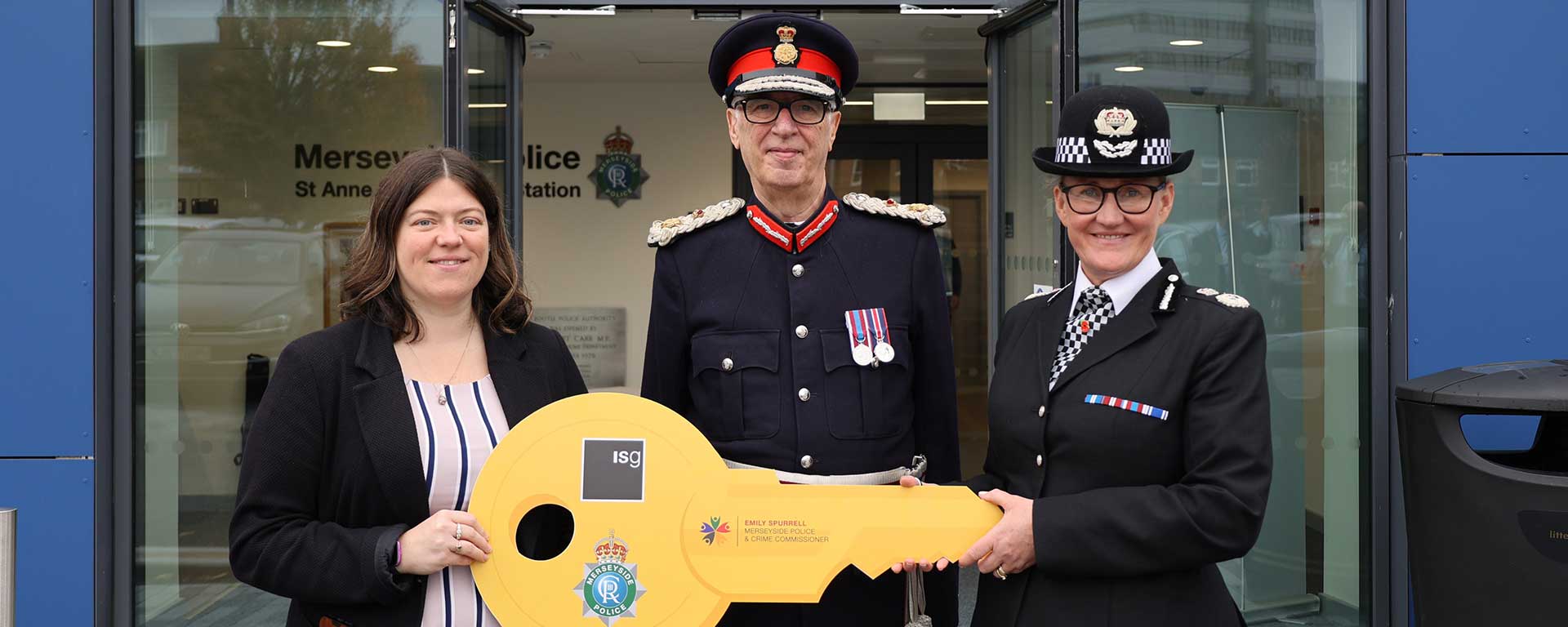
ISG hands over keys to refurbished St Anne Street Police Station in Liverpool

ISG’s refurbishment of St Anne Street Police Station through the North West Construction Hub (NWCH) framework has created a modern, brighter, and more energy-efficient building, with running costs expected to be reduced by at least 18%.
Dignitaries were welcomed by members of Merseyside’s Mounted Section ahead of the station keys being handed over to Merseyside Police and Crime Commissioner, Emily Spurrell, and Chief Constable, Serena Kennedy, by Louise Daville, Director of Public Sector Strategy at ISG, and the Lord Lieutenant of Merseyside declared the building open for business.

St Anne Street first opened in 1972 and has gone on to become Merseyside Police’s busiest operational station. Work to completely refurbish the station, including adding a new floor, began in April 2021. Now transformed, the five-storey station boasts open-plan working spaces and modern AV equipment within each meeting room and will house 450 officers and staff.
Adjacent to Merseyside Police’s state-of-the-art new headquarters Rose Hill, St Anne Street now boasts a similar facade, helping to create a ‘campus’ feel across the site. With a modern new insulated cladding system, LED lighting throughout, electric car charging points and solar panels, the transformation has improved the building’s energy efficiency while reducing carbon emissions, helping to support Merseyside Police’s drive to be the most sustainable force in the country. All of these improvements are expected to reduce running costs – by at least 18% - compared to the original building.
“We are committed to providing state-of-the-art stations facilities for our officers and staff and it’s great to see how St. Anne Street station has been transformed over the past two years. I’d also like to thank the team from construction firm ISG and their subcontractors, who delivered this refurbishment within budget."
Merseyside Police Commissioner, Emily Spurrell
Merseyside’s Police Commissioner Emily Spurrell added: “I’m delighted to join the Chief Constable to welcome the Lord Lieutenant to officially re-open the building today. This major refurbishment will ensure St Anne Street is affordable, sustainable and future-proofed for many years to come, providing officers and staff with the modern facilities and equipment they need to serve our communities.”
Chief Constable Serena Kennedy said: “I am delighted that staff are able to return to work at St Anne Street station, which has been a busy and important operational station for the force since it first opened over 50 years ago.
“It has taken over two years for the extensive refurbishments to take place, but a lot has changed in policing since the 1970s and it is vital that our police stations are modern, accessible, cost effective and fit for purpose for the staff and officers who are based there.
“The force is committed to putting the communities of Merseyside in everything we do. By providing this modern facility means that we can continue to look after our officers and staff and support them in providing the highest level of service to the public.”
As part of ISG’s social value initiatives, nearly 50% of the workforce and resources deployed on the refurbishment came from within Merseyside. The project also saw nine new jobs created, as well as four apprenticeships, with more than 330 apprentice weeks on site.
Louise Daville, Director of Public Sector Strategy at ISG, said: “It was a pleasure for ISG to be able to write the next chapter for this building. St Anne Street Police Station is now modern, brighter, and more energy efficient.
“Creating spaces that enable blue light services to protect and serve our communities is incredibly rewarding. We are proud to be part of the building’s evolution, and to have left a legacy of value in the community through our social value efforts, and apprenticeship and job creation.”
Former officers joined the celebrations, after having a tour in advance of the official opening. Having served in the building when it first opened in the 1970s, they shared some of their experiences and remarked on the improvements made as part of this project:
The project was procured through the North West Construction Hub (NWCH) framework.

